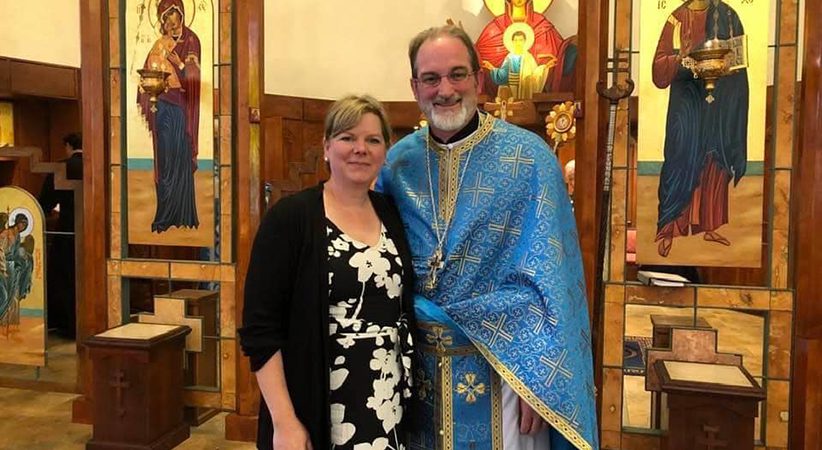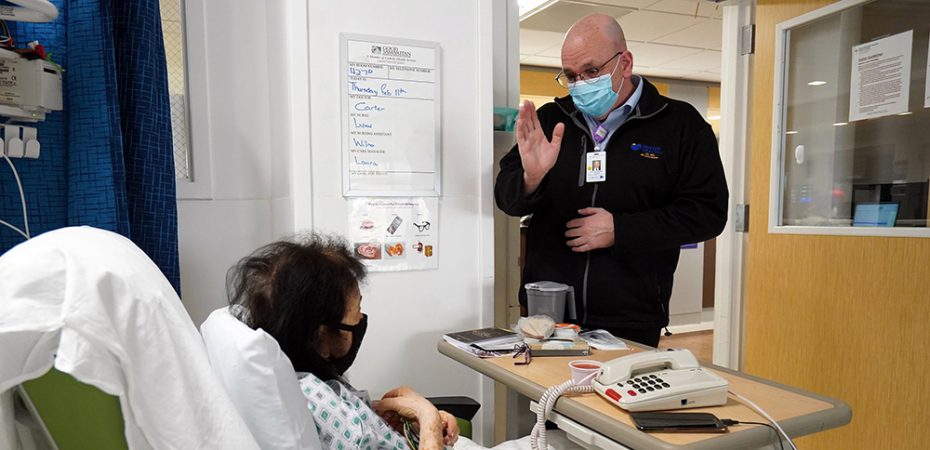Marital First Responders
Dos and don’ts for working with couples in troubled marriages
Dr. Greg Popcak Comments Off on Marital First Responders
Deacons are often among the first helping professionals a couple will contact when they are struggling with marital problems. It’s essential to have a few basic tools to guide your response: how to be helpful, what to avoid and when to refer to professionals.
Research shows that counselors who are trained specifically in marriage therapy have a success rate of over 90%, while general individual therapists who “also see couples” succeed only about 20% of the time. That makes one thing clear: The single most important step you can take as a first responder is to connect struggling couples with a properly trained marriage counselor — early.
At CatholicCounselors.com, my team of Catholic pastoral counselors and I conduct more than 30,000 sessions annually with Catholic couples and families around the world. We specialize in integrating the Church’s timeless wisdom with contemporary, research-based counseling methods.
The following insights come from that work and can support your frontline ministry to hurting couples.
Don’t Give Advice
When people ask for help, it’s tempting to offer advice like, “You need more date nights” or, “You need to communicate with/listen to each other.” These suggestions may be true, but when couples are emotionally overwhelmed, such advice can make them feel more hopeless — especially if they can’t make them work.
Instead of telling couples what they should do, help them discover what already works. This is an approach counselors call “Looking for the differences that make a difference.” Ask questions like:
• When you get along better, what’s different then?
• When you have managed to work better together in the past, what did you do that you might not be doing now?
• Are there times when you don’t feel as frustrated (by this problem or in general)? What do you do that makes that possible?
This strengths-based approach helps couples tap into their own resilience and apply strategies that are already familiar and effective.
Know Your Mission
A common challenge for Catholic helpers is navigating the tension between easing a couple’s pain and preserving the marriage. Some people are too quick to advise separation, while others insist couples stay together no matter the cost.
At CatholicCounselors. com, we attempt to resolve this tension in a faithful manner by remembering that the most important thing we can do is to serve the sacrament.
Marriage is a sacrament of healing. It gives couples the grace they need to heal the damage that sin does to their ability to love each other — not as they prefer to, but as God is calling them to. Christian marriage is ultimately a call to practice Christian discipleship by growing in our ability to respond to God’s call to love each other as he loves us.
As Catholic deacons, your job is to serve the sacrament, not just the individuals in it. This means calling spouses to engage in two tasks.
First, to do the work they need to do personally to heal whatever wounds prevent them from loving their spouse as God calls them to. Second, to practice their prophetic mission: to lovingly challenge one another to grow in holiness. That doesn’t mean badgering or condemning, but inviting and supporting one another in doing the hard work that the Catholic vision of love requires.
What if one spouse refuses to grow? Sometimes the tension between a spouse’s resistance and the other’s commitment to do the work that the sacrament requires causes serious strain in the relationship — or even leads to separation. But to offer authentically faithful assistance to couples, we must avoid urging faithful spouses to stop doing what the sacrament asks — namely, cooperating with grace in their own life and extending an ongoing invitation to their spouse to heal and grow as well.
In the end, our job is not to “save” marriages at all costs, but to encourage spouses to do the work the sacrament of marriage requires. When both embrace this call, the marriage thrives. If one refuses, the outcome is in God’s hands — not ours. But either way, we will have served the sacrament well and the faithful spouse can be confident that they have done God’s will in the relationship.
Teach Them to Pray
Most Catholic couples don’t pray together regularly — and even fewer pray for their marriage. When they do pray, it’s often limited to asking God to “fix” things rather than asking for help to grow in love and wisdom.
One of the first things we teach couples is a simple, powerful prayer framework:
“Lord, I know what I would like to do about this challenge, and my spouse knows what he (or she) would like to do. Help us to know what you want us to do — and help us take care of each other while we work together to discern your will.”
This prayer helps shift the conversation from “me vs. you” to “us and God together.” It fosters humility, connection and an openness to mutual growth.
In my practice, I and my associates teach couples how to use this basic framework as a springboard for deeper discussions and as a gateway to practicing the rules of good discernment.
As a deacon, you are uniquely equipped to teach couples how prayer can be not only a source of comfort, but a source of guidance and inspiration. You can encourage couples to see their marital struggles not as a sign of failure but as an invitation to deeper communion — with each other and with Christ.
Know the Skills Couples Need
In my book “How to Heal Your Marriage and Nurture Lasting Love” (Sophia Institute Press), I outline eight habits that research shows happy couples practice intuitively. I also show how these habits help couples grow in Christian virtues and discipleship. The book offers a simple, practical outline you can walk couples through to help identify the skills they need to develop to have a healthy, happy, holy relationship.
In particular, Chapter 3 includes a comprehensive quiz that helps couples assess their strengths and areas for growth. Once couples complete the quiz, they can focus on the chapters that provide insights and exercises to help them develop the skills they most need to overcome the challenges they are facing.
In addition to offering readers a way to develop an action plan for healing their relationship, the quiz is also a powerful tool for motivating change — especially with resistant spouses who “don’t think we really need help.”
Here are the eight habits and the skills they represent:
1. Rituals of connection: Daily routines for cultivating intimacy by working, playing, talking and praying together.
2. Emotional rapport and benevolence: Building emotional “credit” that helps couples give each other the benefit of the doubt.
3. Self-regulation: Taking responsibility for expressing emotions constructively and staying solution-focused.
4. Positive intention frame: Looking past hurtful behaviors to understand each other’s deeper needs and concerns.
5. Caretaking in conflict: Managing disagreements with compassion and teamwork instead of defensiveness.
6. Mutual respect, accountability and boundaries: Listening for what makes each spouse feel safe, respected and cared for — especially during hard times.
7. Learning from mistakes: Reviewing past challenges in a way that promotes healing rather than rehashing conflict.
8. Getting good help: Finding mentors, resources and professionals who align with Catholic values and can actually help. By helping couples assess and build these skills, you’re giving them a road map for real, lasting change grounded in virtue.
Know When to Refer (and To Whom)
As mentioned earlier, connecting couples with a counselor who has specialized training and supervision in marriage counseling is key. Especially if your initial efforts don’t yield progress, it’s vital to refer them sooner rather than later.
Don’t be discouraged if one spouse isn’t interested in counseling. A skilled, marriage-friendly counselor has learned ways that they can begin working with just one spouse to create the changes that will eventually bring the reluctant spouse to the table.
As a deacon, you are a visible sign of Christ the Servant. When you walk with hurting couples, you aren’t just offering moral encouragement or practical tips. You’re reminding them — by your presence and witness — that the Church still believes in them and that Christ’s grace is real and available.
When a couple is willing to do the work the sacrament asks, no marriage is beyond hope. In fact, with the right spiritual support and practical help, we’ve seen even the most troubled relationships transformed into a beautiful witness to God’s healing love.
In your ministry to struggling couples, you are helping to restore not just relationships but the sacramental witness of Christian marriage itself — and through that, you are helping to renew the Church from the ground up.
GREG POPCAK, Ph.D., is a pastoral counselor, author, radio host and founder of CatholicCounselors.com.





